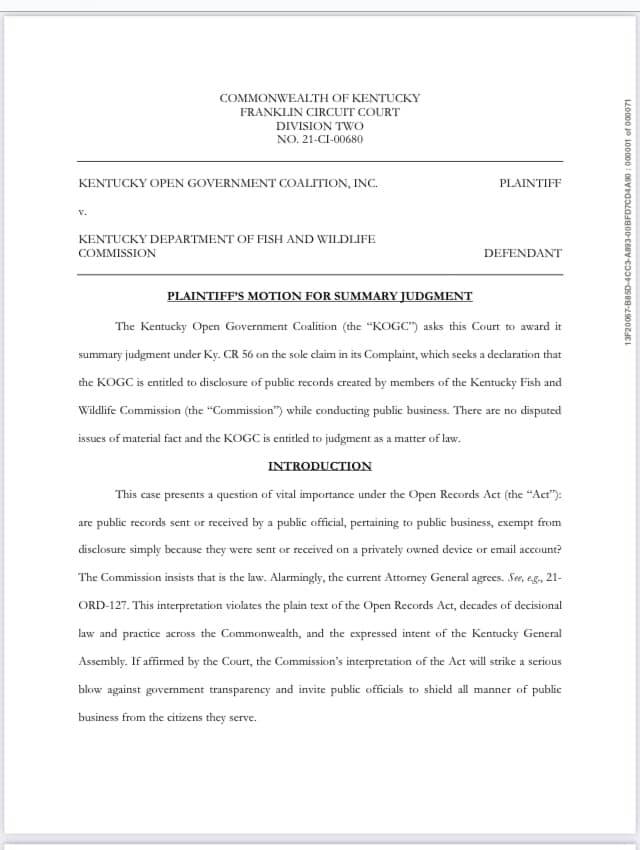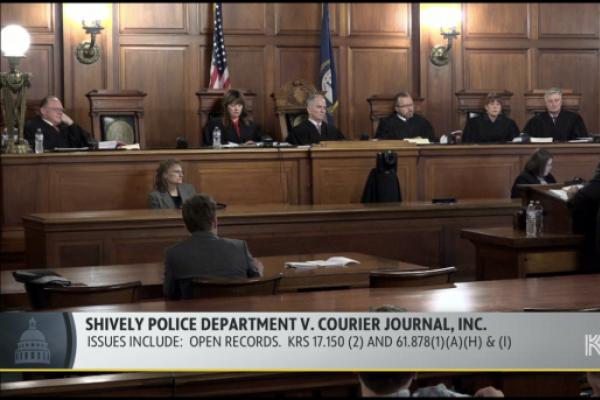
In September, the Kentucky Open Government Coalition filed an open records lawsuit against the Kentucky Department of Fish and Wildlife Commission.
The Coalition is a nonpartisan, nonprofit citizens advocacy group. Our single purpose is to preserve the laws that enshrine Kentuckians' right to know how our government — state and local — governs.
In August, the Commission partially denied our request for emails and text messages exchanged by named department officials, named commissioners, and named legislators during a specific timeframe.
Our request was "not limited to communications that took place on government-owned email accounts and cellphones." By its express terms, the request included "all responsive public records which were generated on private cell phones, on private email services, or through other private communication channels."
Our request acknowledged that '[c]ommunications of a purely personal nature unrelated to any government function" were exempt from public disclosure under KRS 61.878(1)(r).
We did not ask to see, we did not expect to see, and we did not want to see the named public officials' "purely personal," "non-governmental" emails or texts.
Ignoring the broad definition of "public record" in Kentucky's open records law — and well-established legal interpretation — the Commission denied the Coalition access to responsive emails and texts stored solely on Commissioners' personal devices and private email accounts because the emails and texts were not "owned" or "possessed" by the Commission.
The Commission did not claim that the responsive emails and texts that it withheld were unrelated to governmental functions. Instead, the Commission argued that the emails and texts withheld were not "public records" because no public funds were expended for the purchase of the devices or accounts on which they were sent and received.
To our astonishment, the Kentucky Attorney General had thrown his support behind this narrow and dangerous reading of the open records law a few months before, resurrecting a poorly reasoned and legally unsupportable open records decision issued by Attorney General Jack Conway on his last day in office in 2015.
In doing so, Cameron ignored decades of Kentucky authority recognizing that it is the nature and purpose of the record, not the device on which it is created or the place where it is kept, that determines its status as a public record.
Cameron also ignored open records decisions issued by the Attorney General in the four intervening years that repudiated Conway's eleventh hour decision.
Cameron's position, on which the Commission relies, poses a grave threat to the Kentucky open records and open meetings laws.
Neither the Coalition nor the Commission welcomes this legal action. Litigation fatigue is epidemic.
But inaction is not an option. Inaction preserves the status quo. The status quo under Cameron divests the public of its right of access to a substantial body of public records.
Past threats to Kentucky's open government laws pale in comparison to the current threat. Our laws stand at a legal crossroads that will determine nothing less than their continued viability.
If unchallenged, public officials and employees who increasingly rely on email and text to conduct the public's business may elect to "decide what is good for us to know and what is not good for us to know" by choosing to secretly conduct inconvenient or embarrassing discussions on private devices and accounts.
On October 29, the Coalition and the Commission filed cross-motions for summary judgment in the Franklin Circuit Court. The parties' positions are laid out in detail.
https://drive.google.com/file/d/1h_F0PG1W0PJMEyOKYk6mTKl_8JDTnZo2/view?…
https://drive.google.com/file/d/1Ylbuko8Dk--CctKQ4oN8bX6kPN7Oxbkk/view?…
We look forward to a hearing in our case and are optimistic that the remarkably skilled and experienced legal team representing the Coalition's, and the public's, interest — Jon Fleischaker, Michael Abate, and Rick Adams, all of Kaplan, Johnson, Abate & Bird, LLP — will persuade the Franklin Circuit Court that it must reject the Commission's position and the dangerous interpretation on which it is based.
Our position is clear. Consistent with the preamble to Kentucky's open government laws, we maintain that:
"[T]he people of this Commonwealth do not yield their sovereignty to the agencies which serve them; the people, in delegating authority, do not give their public servants the right to decide what is good for them to know; the people insist on remaining informed so they may retain control over the instruments that they have created."



